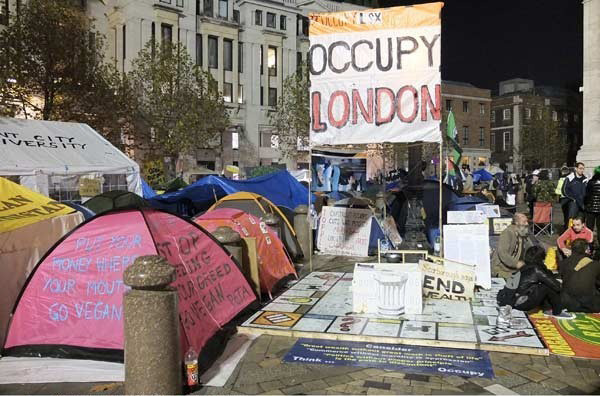AC

How would you define Occupy ?
A coming together of seasoned political activists and people whose politics were brought to the boil by the implacability of the Blair-Bush doctrine and the imperviousness of the financial services sector. It was mostly people who eschewed involvement in mainstream politics either through mistrust of representational democracy and the failure of governments of whatever shade to tackle the urgent issues of our age: grotesque inequality, war and climate change. Through its non-hierarchical structure Occupy gave people who do not normally have a voice a place to speak and was an experiment with new forms of self-organization and direct democracy.
What were you doing before Occupy ?
Working, making films feeling mistrustful, alienated and powerless.
Why did you participate in Occupy?
Capitalism is planet-destroying, iniquitous and irrational and occupy represented the first time in my lifetime that people were prepared to take the fight to the heart of the beast and address the most important issues head on. It was the first time that my politics were represented in the manner appropriate to the urgency of our times.
What impact did Occupy have on your personal life?
Occupy took up a lot of my time I volunteered on the information tent, organised events at USB and the School of Life and especially afterwards in working groups.
Did Occupy change the ways you think, feel and interact with the world? If yes, how so? What do you feel that you learned (or unlearned) that was unique to Occupy?
Occupy had a dramatic impact on what I do think and interact with the world. I was politically engaged indirectly in the arts and culture, but because it introduced me to a type of political activism that reflected my abiding concerns with how the country is run and mankind’s future the entire focus of my life changed. One of occupy’s most distinctive features was its ethos on self-education, the tent city University, teach-ins assemblies and working groups. I would like to think I contributed to and am a graduate of Occupy.
What impact do you think Occupy has had on the economic and political situation?
Occupy created the meme ‘we are the 99%’ which had a massive effect that reverberates tothis day. Occupy provided a short a glimmer of hope that radical change might be possible. After the camps Occupy splintered into its constitutive groups and fueled a number of subsequent protests principally around housing and the decimation of the social fabric. Its members can be found across a wide variety of political fora in London and beyond. Many have made a contribution to Momentum and the People’s Assembly.
I think Occupy changed the political landscape quite dramatically. It played a significant part in redrawing the boundaries of the political imagination and practice. Before Occupy politics was in a virtual coma, even after the banks brought the economic system to its knees capital was imperious and ‘history was over’; there were only a few disconnected places where people who had fundamental and urgent disagreements with capitalism could be active outside of the rather calcified hard left. Occupy lit a flame, changed the political landscape, activated a lot of people, gave hope that fundamental reforms could be made visible. Occupy played a part, I don’t know how big, in changing the terms of political debate and turning attention to the need for systemic change. If occupy refers to a raggle-taggle collective of seasoned political activists the lonely and dispossessed who occupied St Pauls then the political establishment was not moved an inch, if occupy is a synecdoche for wide-ranging worl-wide political protest that is now, in part, reshaping the Labour Party then something may yet be achieved. Tony Benn was clear; the history of the world is the history of the struggle between the rich and powerful and the poor and disposed, in each era the struggle goes on and will do until something finally changes. Occupy was a key moment in this unfinished struggle and it’s effects like Paris May 68 are yet to be measured.
Given the current political and economic situation, what is your view on what people can do to bring long lasting systemic change?
The big story is the re-defining of the Labour party. People can do a great deal if they are prepared to commit the time.
Before Occupy, were you involved in activities related to the reasons why you participated in Occupy? (Activist groups, campaign groups, media platforms, volunteering, research, etc)
I published small pieces and was involved in environmental actions but not a great deal.
Are you still involved in activities related to the reasons why you participated in Occupy? (Activist groups, campaign groups, media platforms, volunteering, research, etc)
Yes
Which ones?
Research
Are you still actively working or engaged with people that you met through Occupy?
No